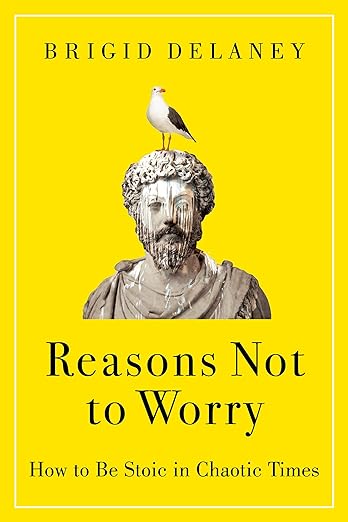
Brigid Delaney’s book *Reasons Not to Worry: How to Be Stoic in Chaotic Times, hit all the right notes for me.
It was an easy read.
It offered personal gut-wrenching stories of the author’s experience.
It broke down the how tos in easily digestible nuggets that stay and helped me get through particularly debilitating flares with long-Covid.
First of all, if you are not familiar with stoicism, it is a way of being that was created by philosophers a very long time ago like BC times. Seneda, Epictetus, Marcus Aurelius are three stoics from the late period of Stoicism. What do three guys from a super long time ago have anything to do with life right now?
Well life during that time was pretty terrifying. Lots of slavery, plagues, violence, which is why the author says stoicism came out of. People were looking for guidance and direction. It all kind of sounds like the world we are currently living in.
Here are the key takeaways that I am going to remember and want to remember about this book:
- Accept that you’re going to die. Not a pleasant thing to think about. But putting everything: your annoying boss, dysfunctional family, toxic relationship(s), in perspective of the fact that we are only here for a finite amount of time (one we don’t know when will end), will change everything. I mean everything. Every time my child says something hurtful, I think of that fact. That not only is my life finite, but so is his. Do I really want to waste it angry or saying something I’ll only have to feel guilty about later?
- Parcel out what you can and cannot control. Feeling indecisive? Seeking spiritual guidance, a guru or psychic to answer your question? Simply decipher what parts you can control (your reactions, your behavior) and what you cannot. In that platter of options, decision-making and worrying becomes less complicated.
- Focus on the values of courage, temperance, justice and wisdom. Material things will come and go. That and health and status are largely not within our control. So if you lose your job or your health is compromised, you still have within it the ability to focus on being calm, having the courage to do what you can, work on getting wiser and fighting for what you believe in. Being indifferent to the guaranteed shift of these things can help us to become more resilent over time.
- Strive for serene instead of happy. It’s about what the author describes as confronting what is outside of us and having mastery over what happens inside of us. One notable doable actionable step is to stop using social media and spend more time in meditation and present awareness.
- Be good. Give without expectation.
- Be neutral. Judgement and our own past experiences color the way we perceive others. Believing that life is for us not against us and being good to ourselves. I have a theory that most of us that are chronically ill have a need to do for others at an expense to our physical and emotional well-being. Somewhere in our childhood we were given the message that we were not okay and to be good, to be normal we needed to put other people above our own needs. So whenever this people pleasing is triggered we fall into a spiral of helping to the detriment or our health.
- Be angry but use it wisely. Anger can give you energy and alert you to boundaries being violated. At the same time, it’s not productive for anyone when you react from anger. Use reasoning to counteract and prevent impulsive reaction. It’s more beneficial to come to situations with neutrality.
- Get comfortable with discomfort. Some stoics go to the extreme and put themselves in particularly uncomfortable situations to remind them that they can handle it. To face the things we fear, remind us we are all a lot stronger and more resilient than we think.
These are the tenets of the book that will stick with me. Which ones do you like? Are you familiar with stoicism? Has it changed your life?
*This link will take you to Amazon where I will receive a small commission if you decide to purchase the book. But you can also just get it from the library or a local bookstore near you.
![]()
